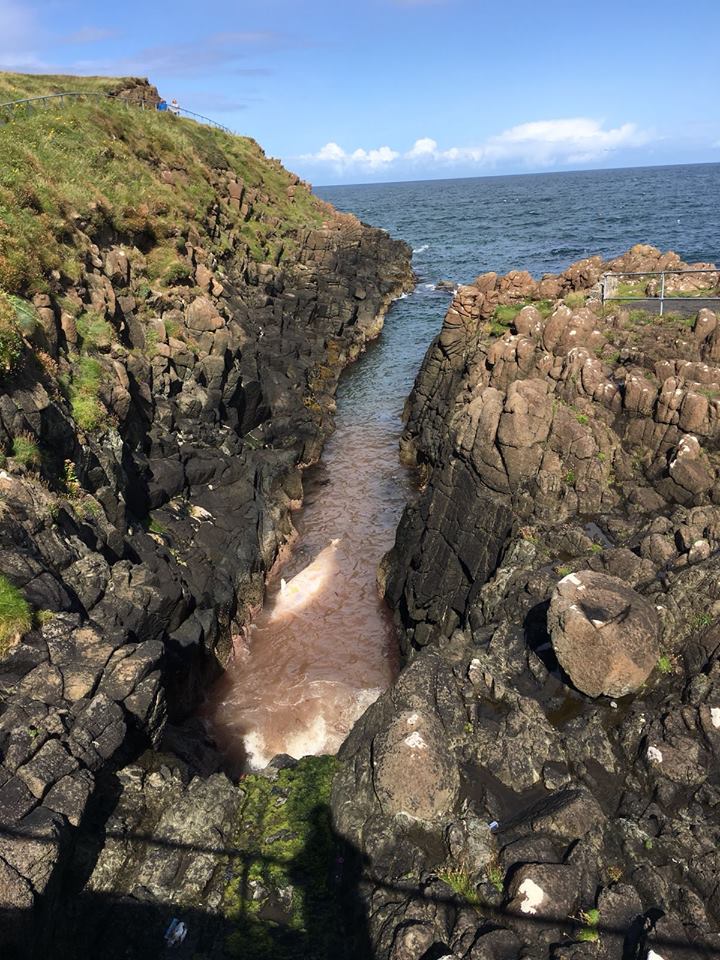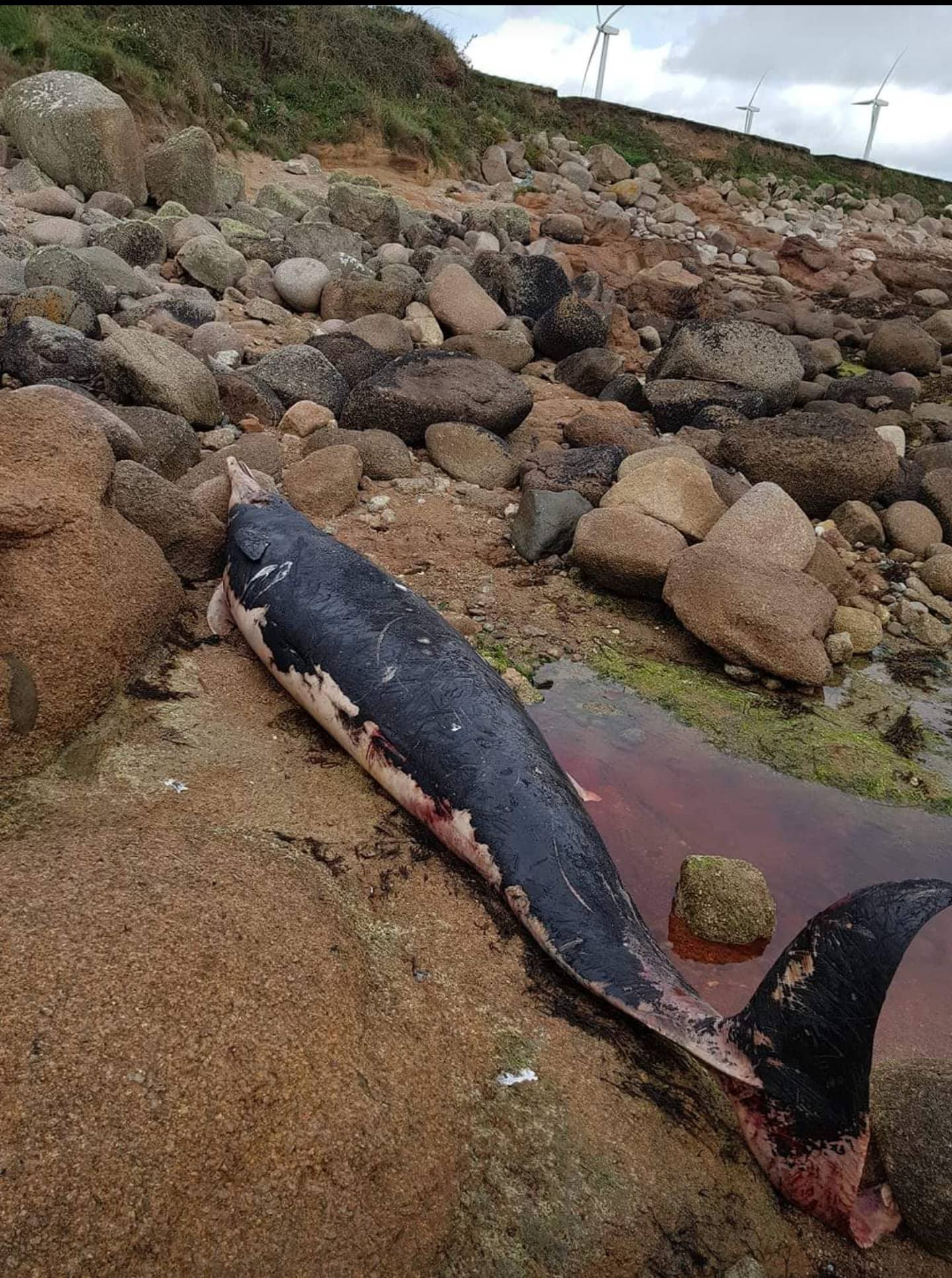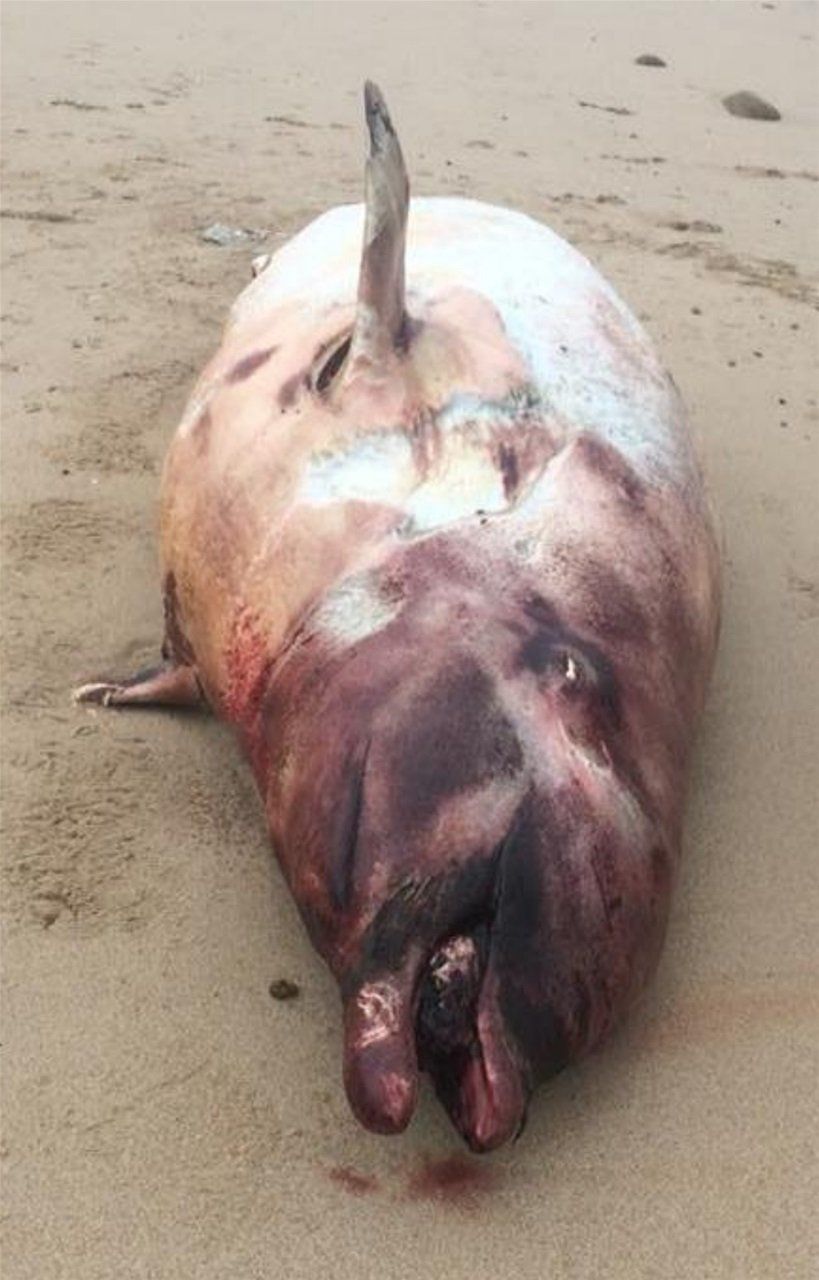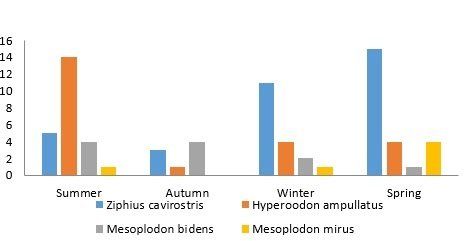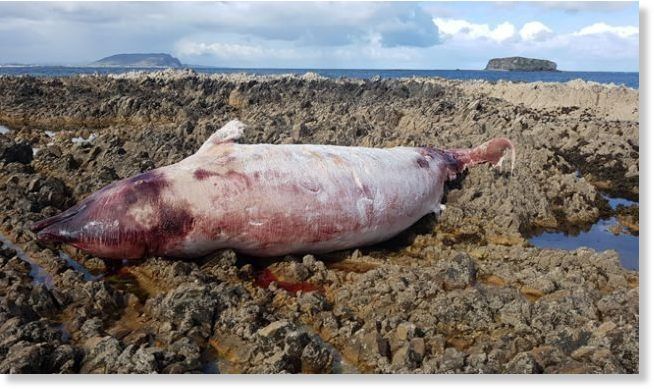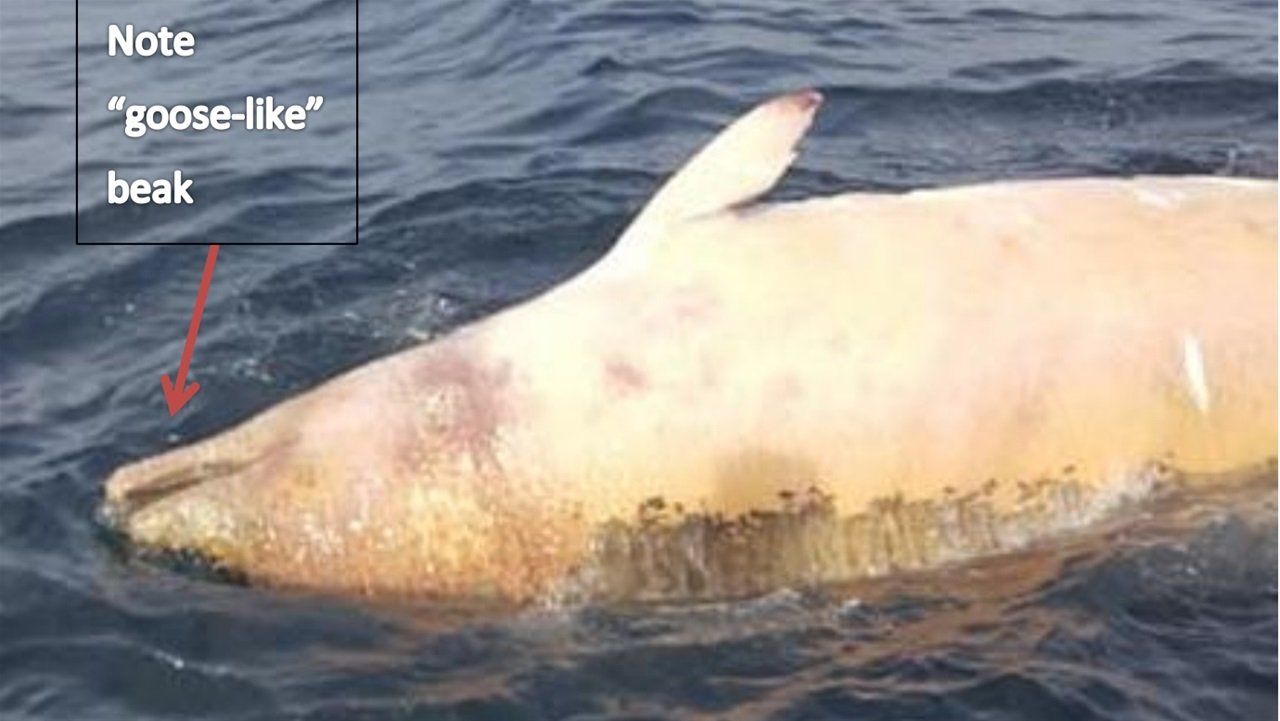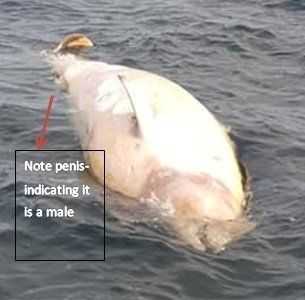Beaked Whale Beaching’s along the Irish coastline August- September 2018.
Ireland and the U.K. hold one of the longest long-term time series of stranding records (Klinowska, 1985; as read in, Hernandez-Milian, 2012). Published stranding records of cetaceans in Ireland dates back to the 1800s and these were reviewed by Berrow and Rogan (1997). McLeod et al. (2004) reviewed strandings of beaked whales in the UK and Ireland from 1800 to 2002 and Dolman et al., (2010) examined “unusual” stranding events in the UK and Ireland of deep diving species in 2008. Most recently McGovern et al., (2017) published a review of spatial and temporal trends of cetacean strandings along the irish coast from 2002 to 2014.
**UPDATE** Over a period of six weeks from the 3rd of August to the 12th of September, 21 Cuvier's beaked whales ( Ziphius cavirostris ) were reported stranded along the Irish coastline from Co. Mayo to Co. Donegal and Co. Antrim. The most recent report came from Cansore Point, Co. Wexford.
It was reported that 38 beaked whales stranded off the Scottish coasts and 2 more were reported stranded in Iceland. That is a total o 61 beaked whales stranded over a short period of time. These are minimum estimates of mortality as they do not account for animals which may have sunk to the seabed or animals stranded in remote places and remain unreported. Previous studies on cetacean carcass drift have suggested that strandings represent a minimum of at sea mortality; depending on drift conditions carcasses may not always wash ashore, thus, the actual number of dead animals may be much higher (Peltier et al., 2014).
Cuvier’s beaked whales are rarely seen alive in Irish waters, although strandings of them are also infrequent through-out the year. Beaked whales are distributed in deep offshore waters beyond the continental shelf and are rarely sighted in coastal waters.
Between 1990 and 2015 there was a total of 85 strandings of beaked whales on Irish shores. In 2015, over a 45 day period, there was a mass stranding fifteen beaked whales along Irish and U.K. shores. This stranding event brings the total number of strandings of beaked whales to date to 94 individuals. Interestingly most strandings of Cuvier's beaked whale occur during the spring seasons. It is unusual to have more then a few strandings of this species during the year, and some years there are no reports of Cuvier's stranding.
In 2013 there were also very notable strandings of True’s beaked whale ( Mesoplodon mirus )with three separate records of single animals from Five Fingers Strand, Malin, Co. Donegal on 12th May 2013 Trawbreaga, Malin, Co. Donegal on 14th May 2013 and Ballyconneely, Co. Galway on 27th May 2013.
The first beaked whale of this unusual mortality event (UME) was reported to the Irish Whale and Dolphin Group from Omey Island, Co. Galway on 3rd of August. On August 4th 2018, it was reported to ORCireland that a Cuvier’s beaked whale was found dead at Duncap Head, Co. Donegal. According to the Irish Whale and Dolphin Group (IWDG) that included one of three whales that stranded dead in Donegal and Mayo. One beaked whale found beached on Gola Isle was reported on August 5th, in addition to one adrift in Sheephaven Bay, Co Donegal and one at Tirraun on the Mullet Peninsula. On the 7th of August another beaked whale was reported to the IWDG from Cliffony, Co. Sligo. On August 8th 2018, another Cuvier’s beaked whale was reportedstrandedto "ORCireland"by "Inishowen Whale and Dolphins" at the “Castles”, Isle of Doagh.
Cuvier’s beaked whale can be distinguished from other beaked whales by the single pair of short (up to 6cm long) conical teeth at the tip of the lower jaw. Usually these teeth erupt from the jaw only in adult males, while they not be visible in immature and adult females. Their main identifying features for this species are cigar shaped body, a small triangular dorsal fin, set two thirds of the way down their back, and a well-defined beak, even though less pronounced than other beaked whale species.
They are brown to light grey in colour, depending on the age. Calves and immature are usually brown, while adult appear paler, also due to the presence of scarring caused by intra-specific competition, parasites and other injuries. Dark patches around the eyes are common in adult animals.
They are usually sighted alone or in small groups (composed by 2 to 12 individuals). Cuvier’s beaked whale is perhaps the most common beaked whale with more reported sightings and strandings than any other beaked whale. There are currently no worldwide abundance stimates for this species, but it is likely to be over 100,000 animals.
Cuvier’s beaked whales are excellent divers, with maximum dive depth and duration having been reliably recorded to depths of over 1, 800m and for up to 85 minutes. Spending up to 80% of their life underwater at depth, operating close to their physiological limits. Feeding mainly on deep water squid species, Cuvier’s beaked whales use echolocation to locate their prey, like other toothed whales or odontocetes. They produce on average ~ 2 usual clicks per second and when they close in on prey they produce ~ 250 echolocation clicks per second. This sequence is also called a “buzz”. The buzz coupled with the dive profile indicates that foraging occurs during the deep dives. It has been estimated that they attempt to catch on average 30 prey items per dive.
Cuvier’s beaked whales suffer from many of the threats that affect all whale species, such as incidental by-catch in fishing gear, heavy metal and pollution intoxication and the effect of global climate change. However, recently there has been a growing concern about beaked whales due to several mass strandings reported worldwide. Forty-one mass strandings of Cuvier’s beaked whales have been reported globally. Furthermore, these likely represent only a small proportion of all dead animals, as some that die offshore may not wash ashore, some that strand may not remain on the beach for more than one tidal cycle and observation effort can vary by location.
Some of mass strandings were concurrent with naval manoeuvres and the use of active sonar: this has raised concerns that certain sounds from sonar could result in the death or injury of beaked whales. For these reasons, in 2004 the Parties to the UNEP CMS Agreement on the Conservation of Cetaceans of the Black Sea, Mediterranean Sea and Contiguous Atlantic Area (ACCOBAMS) adopted a resolution recommending that human activities introducing high-intensity noise in the marine environment be avoided in the areas where high concentrations of beaked whales may occur.
Among the Irish scientific community, great concern exsists with regards to these recent beaked whale strandings as it is not common to have so many strand over a short time period. Some have speculated that the cause of these stranding events may be a result of the U.K's Royal Navy carrying out sonar testing. Mid-frequency active (MFA) sonar has been associated with multiple mass strandings of beaked whales around the world. There is an exercise military zone to the west of Scotland, west of the Outer Hebrides. If this event occurred in British waters, which it could easily have done, then these animals could easily have drifted towards the Irish coast. Including but not limited to any major underwater noise sources which may have been in operation at the time such as military (British Royal Navy) or scientific sonar , seismic surveys and explosives.
Beaked whale foraging ecology is poorly known. Stomach content analyses from stranded animals suggest that many beaked whale species feed primarily on cephalopods (squid and octopus), as wel as some mid-water and demersal fishes in the deep ocean. As dynamics of beaked whale prey are unknown, it is difficult to infer impacts of ecosystem change of a decline in beaked whale populations in offshore Irish waters. Furthermore, as beaked whales are so data deficiant their protection is of priority as we still have so much to learn about the species ecology and biology.
Please sign and share our petition.
© Ocean Research & Conservation Ireland (ORCireland) and www.orcireland.ie , est. 2017. Unauthorized use and/or duplication of this material without express and written permission from this site’s author and/or owner is strictly prohibited. Excerpts and links may be used, provided that full and clear credit is given to Ocean Research & Conservation Ireland and www.orcireland.ie with appropriate and specific direction to the original content.
SHARE THIS ARTICLE






